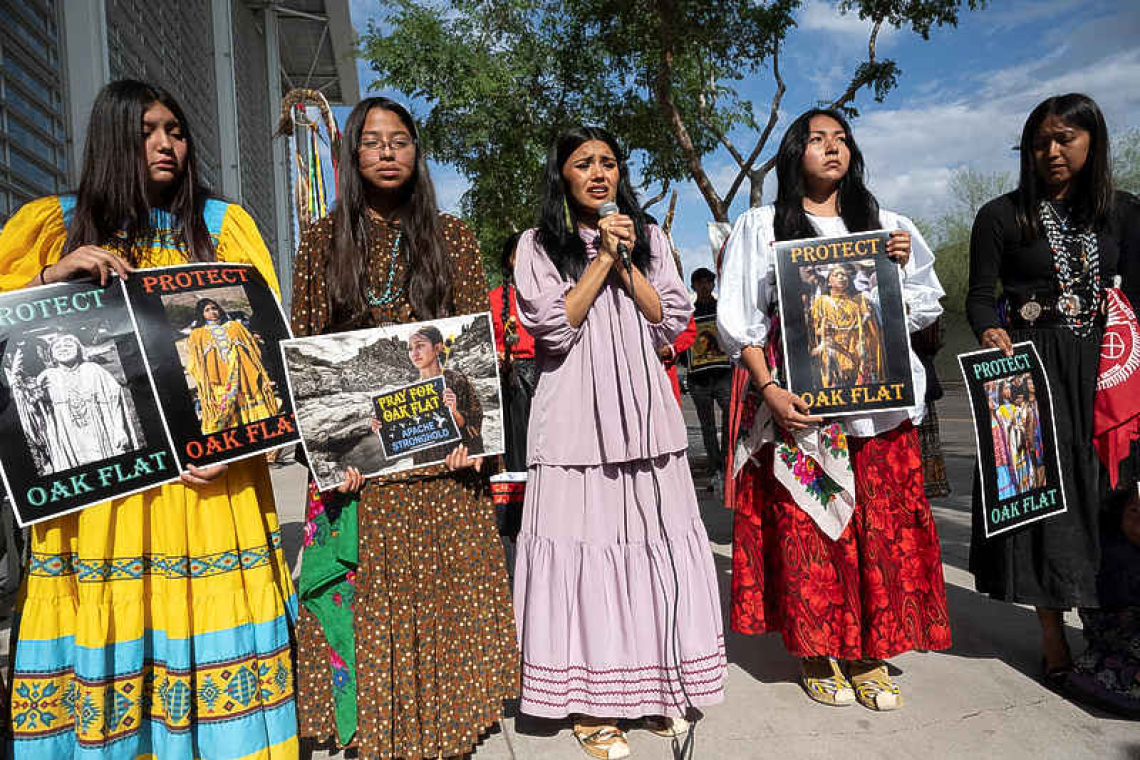WASHINGTON--The U.S. Supreme Court gave a boost on Tuesday to plans for one of the world's largest copper mines, as the justices declined to hear a Native American group's bid based on religious rights to block Rio Tinto and BHP from gaining control of land in Arizona long used for Apache sacred rituals.
The justices turned away an appeal by Apache Stronghold, an advocacy group that includes Arizona's San Carlos Apache tribe and conservationists, of a lower court's ruling that let the federal government swap acreage with the mining companies for the Resolution Copper project. The U.S. government, which has argued in the case that it can do what it wants with federally owned land, is now free to start a process by next month that would give the companies access to the copper-rich acreage.
Republican President Donald Trump's administration has sought to proceed with the land transfer and allow the mine's development. A federal judge in Arizona on May 9 had temporarily blocked the administration from doing so, pending the outcome of the appeal to the Supreme Court.
Apache Stronghold sued in 2021 to try to block the project. It argued that the project, because it would destroy a religiously important site, violates the U.S. Constitution's First Amendment protections for the free exercise of religion, as well as a 1993 federal law called the Religious Freedom Restoration Act.
The sacred site's destruction would violate a 1852 treaty promising that the U.S. government would protect the land and "secure the permanent prosperity and happiness" of the tribe, the plaintiffs added.
The site sits atop a reserve of more than 40 billion pounds (18.1 million metric tons) of copper, a crucial component of electric vehicles and nearly every electronic device. Conservative Justices Neil Gorsuch and Clarence Thomas dissented from Tuesday's action, calling it a "grave mistake" that would let the government destroy a sacred Apache site without the justices even hearing arguments in the case.
"Just imagine if the government sought to demolish a historic cathedral on so questionable a chain of legal reasoning," Gorsuch wrote in the 17-page dissent joined by Thomas. "I have no doubt that we would find that case worth our time."
Conservative Justice Samuel Alito did not participate in the decision. While the court did not give a reason, Alito's 2023 financial disclosure report stated he held investments in BHP. At least four of the nine justices must agree to hear a case.
The project is 55% owned by British-Australian mining company Rio and 45% by Australian mining company BHP. Rio is the project's operator. Both companies have spent more than $2 billion on the project without yet producing any copper.
BHP deferred comment to Rio, which welcomed the court's decision."The Resolution Copper mine is vital to securing America's energy future, infrastructure needs and national defense," said Vicky Peacey, the Rio executive who runs the project.
Apache Stronghold and its lawyers at the Becket Fund for Religious Liberty vowed to continue to fight the project. They urged Congress to block the land transfer."While this decision is a heavy blow, our struggle is far from over," said Wendsler Nosie, an Apache Stronghold leader.
Two other legal challenges are proceeding, one by the San Carlos Apache tribe itself and one by the Center for Biological Diversity, which opposes the mine on environmental grounds.
The Supreme Court's action was applauded by Mila Besich, the Democratic mayor of Superior, the town closest to the project."We've been waiting on this ruling for a very long time," Besich said. "For Superior and all of Arizona, this project will be an economic boon."
The land swap was approved as part of a defense spending bill signed in 2014 by Democratic President Barack Obama, letting the companies exchange acreage they own for a plot of federally owned land about 70 miles (113 km) east of Phoenix called Oak Flat. The swap was conditioned on an environmental impact statement by federal regulators, which occurred in 2021 in the waning days of Trump's first presidential term before being reversed by his successor Joe Biden. The land, called Chi'chil Biłdagoteel in the Apache language, has long been a place where Western Apaches have conducted sacred rituals.
The mine, if built, would create a crater two miles (three km) wide and 1,000 feet (304 meters) deep that would destroy that worship site.







